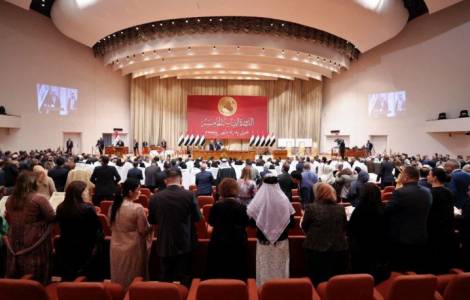The Iraqi Parliament has approved a series of controversial amendments to the electoral system, with changes that are causing heated political controversy and also affect how seats reserved for ethnic and religious minorities, including Christians, are allocated.
The new regulation, approved at dawn on Monday, March 27, provide for a return to an essentially proportional electoral system that is expected to favor large political formations and coalitions, at the expense of independent candidates and smaller political groups.
The new law also calls for the division of territory into very large constituencies.
Monday’s vote was accompanied in the hall by strong protests by independent candidates elected in the 2021 legislative elections, which were called early after popular anti-system protests erupted in 2018 and 2019. Some of the protesting candidates were expelled forcefully from the assembly hall.
The amendments were approved by 206 MPs (there are a total of 219 seats) and had the support of the Shiite parties in the coalition-considered pro-Iranian-that currently has a majority in the Parliamentary Assembly. On Saturday, hundreds of opponents had protested against the new amendments, blocking roads in Baghdad and other Iraqi cities.
Controversy in the hall also concerned the distribution of the five seats reserved by the Iraqi electoral system for Christian candidates. The disagreements on this specific point – reports the information site ankawa.com – reportedly even led to physical confrontation between members of the so-called “Babylon Movement” and Kurdish parliamentarians.
According to the newly introduced amendments, the five reserved for the Christian component will be assigned to two separate mega-electoral constituencies. The two “Christian seats” in Erbil and Dohuk will be assigned within the constituency corresponding to the Iraqi Kurdistan region, while the three seats distributed among Baghdad, Kirkuk and Nineveh will be assigned within the mega-constituency also including the two cities and the area of Mosul and the Nineveh Plain.
According to the regulations governing the new distribution of seats for the Christian component, voters will only be able to vote for Christian candidates running for the seats included in their constituency.
After the legislative elections on October 10, 2021, controversies and tensions had emerged precisely around the distribution and assigning seats reserved for Christian candidates. At the time, as reported by Fides (see Fides, 21/10/2021), the most explicit objections to the results of the election round had come from former Christian parliamentarian Joseph Sliwa, who went so far as to declare that the five new MPs awarded the seats in that quota did not represent Iraqi Christians, given that according to him 90% of the votes cast in their favor did not actually come from Christian voters.
The allegation, which also emerged during the 2018 Iraqi general elections, calls into question major political formations, of Shiite and Kurdish origin, which according to critics, in the last election rounds, diverted a part of their votes to candidates running to win seats reserved for Christians in order to place MPs in those seats who were totally aligned with their own political strategies. In 2021, Sliwa’s accusations had been answered by Evan Faeq Yakoub Jabro, a former minister for refugees and migration in the outgoing government led by Mustafa al Kadhimi, who was elected with nearly 11,000 preferences to the new parliament in the ranks of the “Babylon Movement,” and who had defended the transparency of the electoral process.
In the 2021 elections, the “Babylon Movement” itself had won as many as 4 of the 5 seats reserved for Christian candidates by the national electoral system.
The Babylon Movement emerged as a political projection of the so-called “Babylon Brigades,” an armed militia formed in the context of the military operations against Islamic State (Daesh) jihadists that led to the recapture of the northern-Iraqi areas that had fallen into jihadist hands in 2014. Led by Ryan al Kildani (Ryan “the Chaldean”), the “Babylon Brigades” had always claimed their label as a militia composed of Christians, although their connection with pro-Iranian Shiite militias such as the Popular Protection Units (Hashd al Shaabi) was documented.
The political acronym of the “Babylon Movement” is also considered close to the “Badr Organization,” a political movement that had merged into the Fatah Alliance in the elections, a cartel grouping nine pro-Iranian Shiite acronyms and organizations
by: fides






